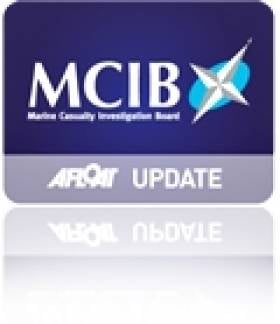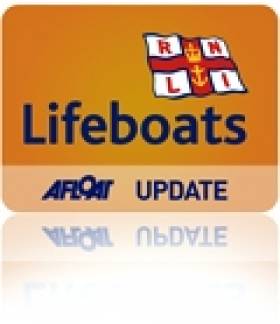Displaying items by tag: fishing pots
Flares No Help to Mayo Fishermen Stranded at Sea - MCIB Report
Two Mayo fishermen stranded at sea after their boat capsized were not assisted after they used flares, a Marine Casualty Investigation Board (MCIB) report has found.
The report, released earlier this week, recounted that the 33m crabber Léim an Bhradán had set out from Porturlin in Ballina on the morning of Saturday 30 October last on a routine fishing trip to retrieve and reset crab and lobster pots some 12 to 15 miles offshore.
The vessel was manned by skipper John O’Donnell, aged 18 at the time, and crew Nathan Flannery, in his 20s, both young men but with many years of fishing experience between them.
At some time between 1pm and 1.45pm, after having successfully hauled and re-shot one tow of pots, a second tow, in the process of being hauled, was partially aboard being emptied and re-baited.
The vessel was listing slightly to starboard due to the pots being hauled over that side when a large wave broke over the starboard quarter and flooded the working deck.
This caused the vessel to list further to starboard, allowing more water over the side and causing the stacked pots and boxes to shift, increasing the angle of the list and throwing both men into the water before the boat capsized and sank rapidly.
The boat's canister-type liferaft, which was not secured to the vessel but stored in a cradle on top of the wheelhouse, floated to the surface with a life ring. O’Donnell and Flannery managed to inflate the raft and climb aboard around 2pm, after some difficulties in operating the gas inflation cannister and releasing the raft from its securing straps.
The men then opened the SOLAS B equipment pack stored on the liferaft and released two parachute flares, 20 minutes apart, with no response. At around 3pm the pair spotted an Irish Coast Guard helicopter and released an orange smoke signal, but the chopper did not respond. It later transpired that this aircraft was the Sligo-based coastguard helicopter on a training exercise.
Several hours later, the alarm was raised ashore when the Léim an Bhradán had not returned to port. A rescue helicopter and lifeboat were tasked to the scene before midnight and the liferaft was located just after 1.30am.
O’Donnell and Flannery, who had earlier donned thermal suits to protect from the cold, were picked up and brought ashore by the lifeboat. Neither was injured in the incident.
The MCIB report found that had the lifeboat been secured to the vessel, it would have been in a position to inflate correctly as per its design.
It also found that had the EPIRB emergency beacon been mounted to a 'float free' bracket outside the wheelhouse, rather than stored inside, it would have floated to the surface and activated automatically, notifying the coast guard immediately.
Neither skipper nor crew was in possession of the boat's handheld VHF set, the report noted, which hampered their ability to contact any nearby vessels for assistance.
Five Rescued When Yacht Gets Tangled in Galway Bay
Galway's RNLI lifeboat was dispatched to retrieve the men after their distress call to the Irish Coast Guard.
The men were en route to Rossaveal Harbour at the time when their yacht became tied up in fishing pots.


























































